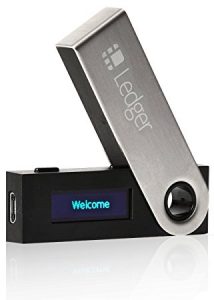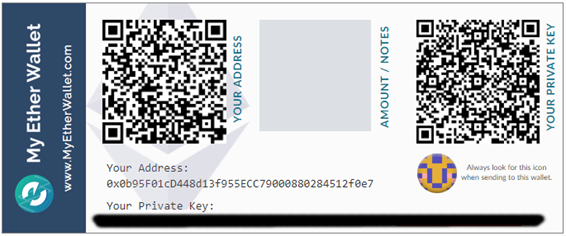Trading, Wallets
Best Multi-Asset Ethereum Wallets [2018]
Last updated: May 1, 2023 6 min read
Vilius Barbaravičius
Have you already made your first crypto investment and are wondering what’s next? Now it’s important to store your funds securely. Let’s review the best multi-asset Ethereum wallets!
 Here’s a no-brainer: we want to protect our funds from being misused or stolen. In our daily lives most of us trust the banks with our money. We hope our credit cards details are safe and we only store PIN codes in our heads. When it comes to keeping cryptocurrencies safe, though, it can get a little trickier.
Here’s a no-brainer: we want to protect our funds from being misused or stolen. In our daily lives most of us trust the banks with our money. We hope our credit cards details are safe and we only store PIN codes in our heads. When it comes to keeping cryptocurrencies safe, though, it can get a little trickier.
One thing to keep in mind is that crypto transactions are irreversible. If you or someone else sends Ether from your wallet, it is virtually impossible to reverse the transaction and to receive the funds back.
Second, when it comes to fraud or theft, there is no institution to complain to or to ask for your money back. Absence of a central authority is one of the major reasons to pick crypto over traditional fiat money, but the uncontrollable nature of cryptocurrencies introduces a variety of risks and responsibilities that consumers must take to protect their assets.
Here comes the need for cryptocurrency wallets – specialised software to securely store and conveniently spend crypto. Below, we overview wallets that support Ethereum specifically, but most of them also allow storing Ethereum-based tokens and other coins.
Types of Ethereum Wallets
First, let’s look into options available out there. There are four broad types of Ethereum wallets, many of which can also support other cryptocurrencies and ERC20 tokens.
- Web interfaces – wallet accessible from a web browser (may also offer interaction with Ethereum features such as dApps and smart contracts)
- Mobile/Desktop wallets – applications for your phone or PC
- Hardware wallets – physical devices that will store cryptocurrencies offline, also called cold storage devices
- Paper wallets – a note with the public and private keys (or a seed from which the keys are generated).
Ethereum is unique in that users can interact with its underlying blockchain. This is why certain wallets will offer features in addition to basic wallet functionality.
All types of wallets have their advantages. While some are very secure (hardware wallets), others are more convenient (such as mobile wallets) while others are more versatile (web interfaces). Let’s dive into specific examples!
Ethereum Web (Desktop) Interfaces
Ethereum and tokens, web-based clients offer ease of use without compromising on security. In fact, wallets such as MyEtherWallet and Metamask are among the best, most convenient and secure ways to store and spend Ether! For everyday use, definitely choose one of these two, if possible!

For a long time, MyEtherWallet was the go-to wallet for storing and spending Ethereum and ERC20 tokens. Key reasons: it is open source, it does not store private keys, and it does not collect sensitive user information. MyEtherWallet is also regarded highly because it interacts seamlessly with hardware wallets such as Trezor and Ledger Nano S.

Metamask has become one of the most convenient Ethereum wallets. Built as a browser extension for Chrome, Firefox, Opera or Brave, it has an intuitive minimalistic interface. At the same time, Metamask is extremely rich with features: it allows users to interact with dApps, acting as an Ethereum network browser, and since recently supports spending ERC20 tokens. By the way, you can use Metamask to pay CoinGate invoices while avoiding copy-pasting addresses or scanning QR codes!
Hardware Wallets

Hardware wallets are certainly the most secure option for storing cryptocurrencies. Trezor and Ledger are the most popular hardware wallet brands, whose products support a wide range of cryptocurrencies, including Ether and tokens. Some notable alternatives are KeepKey and CoolWallet S. One downside of hardware wallets is their price, starting around $100 per device.
Trezor One is the very first, and to date perhaps the most widely owned hardware wallet, supporting over hundreds of different coins and tokens, among them Ethereum. Recently, the company released the new Trezor Model T, running on a dedicated OS and featuring a colour touchscreen.

Ledger Nano S is a popular mainstream alternative resembling a USB stick, and is slightly cheaper than its main competitor. Ledger Nano S supports more than 700(!) different cryptocurrencies, including a vast number of Ethereum-based tokens.
Mobile/Desktop Ethereum wallets (multi-asset)
 Wallets that can be accessed with several devices at once, for example from a computer as well as a smartphone, offer a great deal of convenience for daily use. Such clients are usually very lightweight and can be setup in a matter of minutes.
Wallets that can be accessed with several devices at once, for example from a computer as well as a smartphone, offer a great deal of convenience for daily use. Such clients are usually very lightweight and can be setup in a matter of minutes.
One of the most widely used wallets in this segment is Jaxx. This application works on both Android and iOS, and also supports Windows, Mac OS, and Linux. Most importantly, the private keys never leave the device. Also, Jaxx doesn’t require registration or any input of private information of its users.
Exodus is a popular alternative that is available for desktop use (Windows, Linux and Mac). If you’re looking for a mobile-only wallet, then we would definitely recommend Coinomi. The wallet is highly regarded in the crypto community as one of the most secure multi-asset wallets, supporting over 500 different coins and tokens. Coinomi is available for both iOS and Android.
We only recommend using the same wallet on several devices if it’s an absolute necessity and you are making transactions regularly. Make sure not to store a large amount of Ethers or any other cryptocurrency on such wallets, and always make backups!
Paper Ethereum Wallets
Paper wallets are another type of cold storage. Contrary to hardware wallets, they are inexpensive and available for everyone. Paper wallets are, essentially, a piece of paper on which private keys or wallet seed is stored. The web-based MyEtherWallet can also generate private keys for storing Ether offline. All that is needed is to download a keystore file, print the keys and QR-code in multiple copies and store in safely.

A matter of choice
The first rule of the crypto market – you and only you are responsible for keeping your assets safe.
To this date, however, many users rely on exchanges for holding funds, even when not trading actively. The rich history of exchange hacks speaks for itself: virtually all notable exchanges lost funds at some point due to breaches. In 2018 alone hackers stole over $700 million worth of crypto from exchanges.
With all sorts of dangers, cryptocurrencies are challenging their owners in terms of security, but options are available. Whichever wallet you end up using is a personal choice, but security should always be taken seriously. Only store large quantities of cryptocurrencies offline, best case – on hardware wallets that are securely backed up.
Written by:
Vilius Barbaravičius
Vilius is a seasoned copywriter and bitcoin enthusiast specializing in blockchain and cryptocurrency topics. He's been with CoinGate since 2018, writing blogs, social media content, sales materials, newsletters, FAQs, and more. He's relentless in pursuing knowledge and a better understanding of the crypto industry, which helps him create meaningful and engaging content every day.
Vilius is a seasoned copywriter and bitcoin enthusiast specializing in blockchain and cryptocurrency topics. He's been with CoinGate since 2018, writing blogs, social media content, sales materials, newsletters, FAQs, and more. He's relentless in pursuing knowledge and a better understanding of the crypto industry, which helps him create meaningful and engaging content every day.
Related Articles